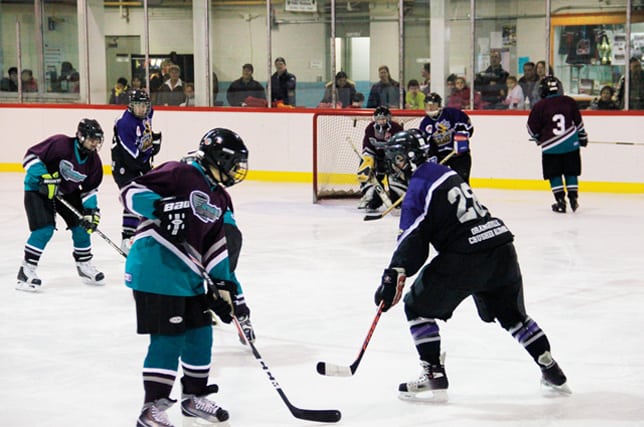Everyone can play
Toronto league focuses on players’ abilities, not disabilities, as special needs kids and adults get to play hockey
 Everyone can play
Everyone can playBy Nicholas Carafa
As Pat Flick walked out of the dressing room at Toronto’s Grandravine Arena, he saw a father of one of his players in tears. Flick had done in three attempts what the father had tried for 13 years: teach his special needs son to tie his own skates.
“We didn’t treat them like the handicapped because I didn’t know how to treat a handicap,” Flick says. “I figured I might as well treat them like hockey players.”
Flick, 74, is the founder of the Grandravine Tornadoes, an organization that gives six- to 60-year-olds with disabilities the chance to play. Back in the 1980s, Flick was the director for the house and rep leagues that ran out of Grandravine Arena. The idea of a league for the developmentally challenged came to him when he saw two boys with disabilities watching avidly through the glass as their older brothers played.
“During that time, people didn’t think it could be done,” Flick says. “They thought the kids wouldn’t have the attention span to last more than 15 or 20 minutes. Right off the bat they proved people wrong.”
Flick founded the Tornadoes in 1980 and ran them for 14 years with his wife, Joan. Thanks to sponsorship money, the team was tailored for jackets, bags, jerseys and socks, splashed with its trademark purple-teal color scheme.
Joe Rizzuto had his son, Mark, suited up for the Tornadoes for the first time in 1994. He became involved in team fundraisers and took over when Pat retired in 2005. For Rizzuto, whose son has Down syndrome, a disability is no reason to keep someone off the ice.
“It’s not because the players can’t do it,” Rizzuto says. “It’s because we as parents are overprotective sometimes and feel like we have to intrude on what they’re doing, instead of letting them go out there and do what they want to do.”
Despite the growth of the organization, the Tornadoes never had another team to play until 1994, when a club in St. Louis, Mo., invited them to compete in the inaugural Special Hockey Tournament. That sparked the creation of Special Hockey International, which has teams across North America and in Sweden, Norway and Finland. Now more than 70 teams attend the SHI tournament.
Flick, who doesn’t have a developmentally challenged child, was constantly asked about the appreciation he received for his efforts.
“You get the recognition for something whether you want it or not,” he says. “If you do it for the right reason and you see what the kids do, there is no award I could ever receive that would take the place of the feeling I got after doing what I did.”
This feature originally appeared in the March 3 edition of The Hockey News magazine. Get in-depth features like this one, and much more, by subscribing now.

